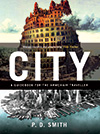Seasons of Life
11 August 2009 | Reviewing | 3 comments
The Guardian has just published my review of Russell G Foster and Leon Kreitzman's fascinating new book, Seasons of Life: The Biological Rhythms that Living Things Need to Thrive and Survive. Their first book, Rhythms of Life (2004) - which I reviewed for the Independent - explored the science of the circadian clock (circa, about; dies, day) and explained how cells and "clock" genes form a molecular metronome inside us that synchronises body-time with world-time across 24 hours.
Their new book shows that, as well as a 24-hour clock, organisms contain a circannual clock with a periodicity of a year. These two studies provide a remarkable glimpse into the working of nature's inbuilt timing mechanisms. You can read my review of Seasons of Life here.


Michael Gross | 17 August 2009
intriguing stuff. I vaguely know how circadian clock works and the annual timing in plants. With Homo sapiens there is a problem -- as we evolved in tropical Africa without any daylength variations, we can't have evolved a circannual clock. We can of course respond to variation of day length that we experience now (as we do in SAD), but I would find it difficult to rationalise how we would have evolved a season clock in the absence of seasons (defining "clock" as something that runs on even if the external cues are switched off, as the circadian clock does if you live in permanent light or darkness). Do the authors have an answer to this ?
PD Smith | 17 August 2009
I think the authors would place the emphasis on the adaptations of our early ancestors that enabled them to survive & reproduce by anticipating seasonal changes. These, they say, "still reside deep within our metabolism and life histories".
The authors suggest that as early humans moved from the equatorial regions to higher latitudes the ability to adapt to seasonal change became a factor in their survival: the battle with the seasons became an engine of natural selection. They admit that the question as to whether there is an innate circannual rhythm in humans or whether it is learnt behaviour is "arguable".
However, given the amount of evidence they present regarding seasonal effects in human health etc, the implication is that this is an innate mechanism which has yet to be fully described.
It's an interesting book - well worth reading.
Michael Gross | 18 August 2009
ok, thanks ! I guess more research is needed on that one. for instance comparisons between people of European origin and Africans whose ancestors may never have moved outside the tropics.